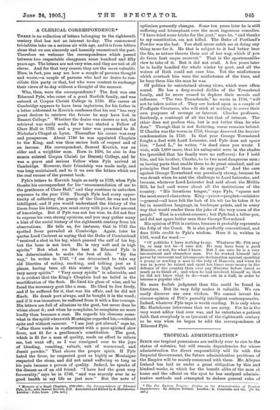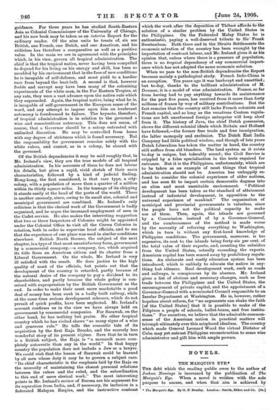SINCE our tropical possessions are unlikely ever to rise to
the status of colonies, but will remain dependencies for whose administration the direct responsibility will lie with the Imperial Government, the future administrative problems of the Empire will be mainly concerned with them. Mr. Alleyne Ireland has laid us under a great obligation by this, and kindred works, in which for the benefit alike.of the man at home and the official on the spot he has analysed adminis- trative methods and attempted to deduce general rules, of • The Far Eastern Tropics : Studies in the Administration of Tropical Dependencies. By Alleyne Ireland. London; A. Constable and Co. [7s. Od. nat.]
guidance. For three years he has studied South-Eastern Asia as Colonial Commissioner of the University of Chicago, and his new book may be taken as an interim Report for the ordinary reader. Of the nine units he treats of, six are British, one French, one Dutch, and one American, and his criticism has therefore a comparative as well as a positive value. In the main we are in agreement with the principles ivhich, in his View, govern all tropical administration. The chief is that the tropical native, never having been compelled to depend for his living on his energy and skill, has been so moulded by his environment that in the face of new conditions he is incapable of self-defence, and must yield to a hardier race from beyond the heat-belt. A second is that, however feeble and corrupt may have been many of the colonising experiments of the white man, in the Far Eastern Tropics, at any rate, they were a vast advance upon the native rule which they superseded. Again, the tropical native, being what ho is, is incapable of self-government in the European sense of the word, and any attempt to impose upon him an irrelevant autonomy is foredoomed to failure. The keynote, therefore, of tropical administration is in relation to the governed a wise and conscientious autocracy. This does not mean, of course, that a Governor should be a satrap entrusted with unlimited discretion. He may be controlled from home with any degree of strictness which is found necessary. But the responsibility for government remains solely with the white rulers, and cannot, as in a colony, be shared with the governed.
Of the British dependencies it may be said roughly that, in Mr. Ireland's view, they are the true models of all tropical administration. In his accounts of them ho does not labour his details, but gives a rapid, vivid sketch of their main characteristics, followed by a kind of judicial finding.
Hong-kong, the first considered, is that rare type, a city.
colony, with a population of more than a quarter of a million within its thirty square miles. In the tonnage of its shipping it stands easily at the head of the ports of the world. There is another anomaly, since, owing to its small size, colonial and municipal government are combined. Mr. Ireland's only criticism is that the clerical work of the Government is badly organised, and he urges the increased employment of men in the Cadet service. He also makes the interesting suggestion that two or three Inspectors of Colonies might be appointed under the Colonial Office to visit all the Crown Colonies in rotation, both in order to supervise local officials, and to see that the experience of one place was used in similar conditions elsewhere. British North Borneo, the subject of the next chapter, is a type of that most unsatisfactory form, government by a commercial company,—a company, too, which acquired its title from an American citizen and its charter from a Liberal Government. On the whole, Mr. Ireland is very ill satisfied with the result. He does justice to the high quality of most of the officials, but points out that the development of the country is retarded, partly because of the natural desire of the company to pay a dividend to its shareholders, and partly because the whole policy is con- ceived with expropriation by the British Government as the end. In order to make their asset more marketable a good deal of money has been sunk in a badly built railway, while at the same time serious development schemes, which do not permit of quick profits, have been neglected. Mr. Ireland's account confirms us in the view we have always held on government by commercial companies. For Sarawak, on the other hand, he has nothing but praise. No other tropical country which he has visited shows "so many signs of a wise and generous rule." He tells the romantic tale of its acquisition by the first Raja Brooke, and the scarcely less wonderful story of its present regime. Save that he in turn is a British subject, the Raja is "a monarch more com- pletely autocratic than any in the world." In that happy country the population does not include a Jew or a lawyer. We could wish that the lesson of Sarawak could be learned by all men whose duty it may be to govern a subject race. "Its chief characteristic is the emphasis laid by the Raja on the necessity of maintaining the closest personal relations between the rulers and the ruled, and the subordination to this end of mere clerical work." The most interesting points in Mr. Ireland's review of Burma are his argument for its separation from India, and, if necessary, its inclusion in a federated Malayan Empire, and the instructive contrast which the work after the deposition of Thibaw affords to the solution of a similar problem by the United, States in the Philippines. On the Federated Malay Stites he is enthusiastic, paying a well-deserved tribute to Sir' Frank Swettenhara: Both there and in the Straits Settlements the economic salvation of the country has been wrought by the importation of contract labour, and Mr. Ireland gives it as his opinion that, unless where there is a pressure of population, there is no tropical dependency of any commercial import- ance which has not adopted the same economic solution. When we pass to the non-British dependencies the Report becomes mainly a pathological study. French Indo-China is an exception. Ten years ago it was bankrupt and unsettled ; but to-day, thanks to the brilliant administration of M.
Doumer, it is a model of wise administration. France, so far from having had to pay anything towards its maintenance
for the past five years, has received from it.more than forty millions of francs by way of military contributions. But the fact remains that the country still lacks French colonists and French capital, and so long as the vexatious Custom regula- tions are left unreformed foreign enterprise will keep aloof from it. The history of Java, the chief Dutch possession, shows the different colonial ideals which Britain and Holland have followed,—the former free trade and free immigration, the latter monopoly and exclusion. The Dutch That India Company had little political wisdom, and though of late years Dutch. Liberalism has taken the matter in hand, the country still suffers from old blunders. The land system as it exists to-day is unique, but tolerably sound ; the Civil Service is crippled by a false specialisation in the tests required for entrance. But it is the Philippines, unfortunately, which are to be taken as an example of most things that tropical administration should not be. America has unhappily re- fused to consider the colonial experience of older nations, and has seen fit to import certain democratic dogmas into an alien and most unsuitable environment. " Political development has been taken as the standard of attainment instead of industrial development, in opposition to the universal experience of mankind." The organisation of municipal and provincial governments is valueless, since the people have not the political capacity to make use of them. Then, again, the islands are governed by a Commission instead of by a Governor-General; and the cumbrousness of the method is made worse by the necessity of referring everything to Washington, which in turn is without any first-hand knowledge of Philippine conditions. The government, moreover, is too expensive, its cost to the islands being forty-six per cent. of the total value of their exports, and, counting the subsidies from the United States, actually exceeding the exports. American capital has been scared away by prohibitory regula- tions. An elaborate and costly education system has been introduced, which is unlikely to educate the native in any- thing but idleness. Real development work, such as roads and railways, is conspicuous by its absence. Mr. Ireland gives a list of obvious and necessary changes, such as free trade between the Philippines and the United. States, the encouragement of private capital, and the appointment of a Governor-General with a nominated Council responsible to an Insular Department at. Washington. He is, however, rather hopeless about reform, for "no arguments can shake the faith [of the United States] that it is possible to make of the Filipinos a people of schools, ballot-boxes, and free institu- tions." For ourselves, we believe that the admirable common- sense of the American nation in practical matters will triumph ultimately over this misplaced idealism. The country which made General Leonard Wood the virtual Dictator of Cuba may yet entrust Philippine reconstruction to some wise administrator and gift him with ample powers.



















































 Previous page
Previous page